
At once epic and intimate, Evangeline Ordaz’s This Land weaves two centuries of Watts history—from the Mexican ranchers who seized Tongva Indian land in the 1880s, to the white homeowners who took flight in the 1950s when blacks moved in, to the Latinos who became the majority four decades later, to today’s white gentrifiers—into two absorbing, illuminating hours of Los Angeles theater at its best.
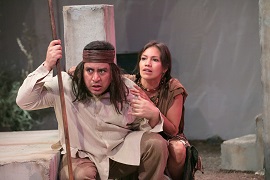 The year 1843 sees handsome young Mexican scion Enrique (Jeff Torres) falling for Toya (Cheryl Umaña), the beautiful, proud daughter of Tongva village chief Tomas (Richard Azurdia), to Enrique’s wealthy rancher family’s dismay.
The year 1843 sees handsome young Mexican scion Enrique (Jeff Torres) falling for Toya (Cheryl Umaña), the beautiful, proud daughter of Tongva village chief Tomas (Richard Azurdia), to Enrique’s wealthy rancher family’s dismay.
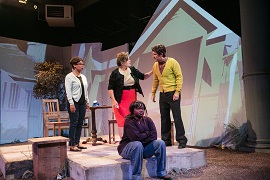 1949 brings African-American widowed mom Leola Piqueray (LeShay Tomlinson Boyce) and her teenage daughter Leslie (Niketa Calame) to the onetime Indian village now known as Watts, freshly arrived from the Jim Crow South and greeted with open arms by Oklahoma-transplant neighbor Maeve Hilman (Johanna McCay) but less warmly so by Mrs. Hillman’s fellow whites, then the majority of homeowners.
1949 brings African-American widowed mom Leola Piqueray (LeShay Tomlinson Boyce) and her teenage daughter Leslie (Niketa Calame) to the onetime Indian village now known as Watts, freshly arrived from the Jim Crow South and greeted with open arms by Oklahoma-transplant neighbor Maeve Hilman (Johanna McCay) but less warmly so by Mrs. Hillman’s fellow whites, then the majority of homeowners.
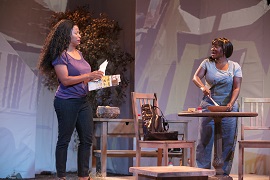 Watts circa 1994 has Leslie’s adult daughter Sharon Curtis (Tomlinson) none too pleased to see Mexican immigrant Fidel Avila (Azurdia) and his American-born nephew Ricardo (Torres) not only moving into the house Mrs. Hilman once called home but parking their taco truck in a neighborhood where Spanish is now the language du jour, though Sharon’s younger sister Mel (Calame) may be a different story once Ricardo has caught her eye.
Watts circa 1994 has Leslie’s adult daughter Sharon Curtis (Tomlinson) none too pleased to see Mexican immigrant Fidel Avila (Azurdia) and his American-born nephew Ricardo (Torres) not only moving into the house Mrs. Hilman once called home but parking their taco truck in a neighborhood where Spanish is now the language du jour, though Sharon’s younger sister Mel (Calame) may be a different story once Ricardo has caught her eye.
Fast forward to 2020 and a thoroughly assimilated Ricardo, now forty-three, facing the very real possibility of losing the house once occupied by Mrs. Hillman to developer Dalton Hill (Alda), bent on building a mini-mall where residences once stood.
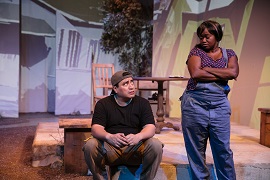 If all this sounds like enough material for an eight-part miniseries, it well could be, just one reason why playwright Ordaz’s two-hour play impresses.
If all this sounds like enough material for an eight-part miniseries, it well could be, just one reason why playwright Ordaz’s two-hour play impresses.
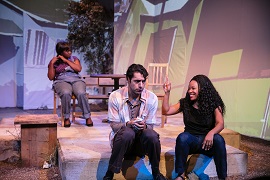 Under Armando Molina’s ingenious direction, This Land’s multiple plot threads and time transitions morph cohesively and coherently into one compelling narrative, scenes transitioning from era to era with a time-travel whoosh (courtesy of sound designer Rebecca Kessin) as cast members morph from character to character with a wig or hat or vest … and voices and accents to match.
Under Armando Molina’s ingenious direction, This Land’s multiple plot threads and time transitions morph cohesively and coherently into one compelling narrative, scenes transitioning from era to era with a time-travel whoosh (courtesy of sound designer Rebecca Kessin) as cast members morph from character to character with a wig or hat or vest … and voices and accents to match.
A fresh-water well that Enrique digs for Toya, a notebook in which Mrs. Hilman keeps a written record of Mrs. Pickeray’s prized recipes, and food and cooking utensils that pass from the hands of characters in one time zone to another help connect the decades as well, with a couple of touching love stories adding romantic appeal along the way, one between a boy and a girl who don’t speak a word of each other’s languages, the other between a muchacho and a sista whose cultural gap is almost as wide.
Boyce and Calame create four very real, absolutely distinct women doing their best to live full lives in a racist world, Calame scoring bonus points for her gender-bending mission guard Pepe Neri.
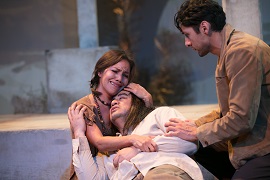 Azurdia’s heroic Tomas and his sweet and gentle Fidel are both gems as are Torres’s lovestruck Enrique and his boy-to-man Ricardo, and Umaña does dynamic work as both a Tongva fighting to retain her dignity and as Mrs. Piqueray’s great-granddaughter Della.
Azurdia’s heroic Tomas and his sweet and gentle Fidel are both gems as are Torres’s lovestruck Enrique and his boy-to-man Ricardo, and Umaña does dynamic work as both a Tongva fighting to retain her dignity and as Mrs. Piqueray’s great-granddaughter Della.
McKay shines too as a warm and folksy Mrs. Hilman, with Alda acing a grand total of six roles including a milkman, a delivery man, and a repairman who show up at Mrs. Piqueray’s doorstep for services she insists she did not order.
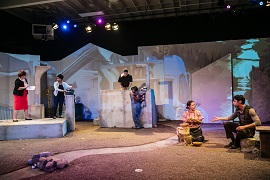 The mammoth stage of Company Of Angel’s brand new Boyle Heights “black box” offers scenic designer Justin Huen the expansive canvas on which to recreate an entire neighborhood as Benjamin Durham’s striking video design transports us from decade to decade, century to century.
The mammoth stage of Company Of Angel’s brand new Boyle Heights “black box” offers scenic designer Justin Huen the expansive canvas on which to recreate an entire neighborhood as Benjamin Durham’s striking video design transports us from decade to decade, century to century.
Manee Leija’s multi-era costumes, Heather McLane’s multitude of props, Kessin’s vivid sound design, and Huen’s expressive lighting complete a particularly impressive production design.
This Land’s Company Of Angels World Premiere is produced by Tamadhur Al-Aqeel. Daniel Muñoz is stage manager and McLane is assistant stage manager.
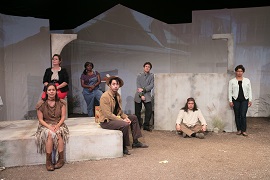 Not only will This Land likely send you home wanting to learn more about Watts beyond the riots of ’65, it may well have you returning with friends and family in tow. L.A. theater doesn’t get more edifying, relevant, or impactful than this.
Not only will This Land likely send you home wanting to learn more about Watts beyond the riots of ’65, it may well have you returning with friends and family in tow. L.A. theater doesn’t get more edifying, relevant, or impactful than this.
Company Of Angels, 1350 San Pablo Street, Los Angeles.
www.companyofangels.org
–Steven Stanley
October 30, 2017
Photos: Grettel Cortes Photography
Tags: Company Of Angels, Evangeline Ordaz, Los Angeles Theater Review, Watts



 Since 2007, Steven Stanley's StageSceneLA.com has spotlighted the best in Southern California theater via reviews, interviews, and its annual StageSceneLA Scenies.
Since 2007, Steven Stanley's StageSceneLA.com has spotlighted the best in Southern California theater via reviews, interviews, and its annual StageSceneLA Scenies.







 COPYRIGHT 2025 STEVEN STANLEY :: DESIGN BY
COPYRIGHT 2025 STEVEN STANLEY :: DESIGN BY